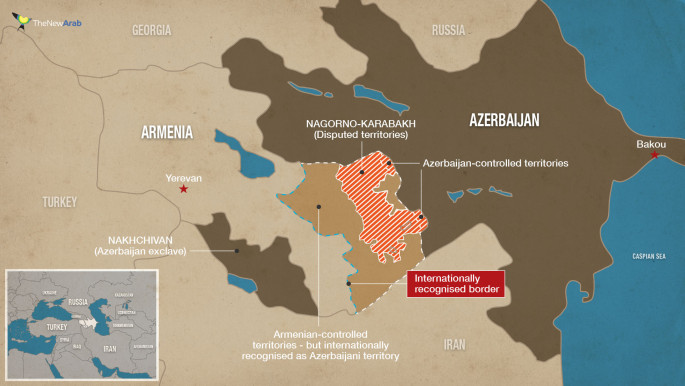Turkish foreign minister visits Azerbaijan as conflict continues
Turkey's foreign minister Mevlut Cavusoglu arrived in Azerbaijan, a close ally, on Tuesday for talks on the conflict in the ethnic Armenian separatist region of Nagorno-Karabakh.
The Turkish foreign ministry announced that Cavusoglu will meet with President Ilham Aliyev and "also exchange views on the present situation in the Armenian occupied Nagorno-Karabakh region of Azerbaijan" with his Azerbaijani counterpart.
The visit comes a day after Russia, the United States and France called on Armenia and Azerbaijan to agree to an "unconditional ceasefire" after the neighbours began shelling major cities in an escalation of their conflict over the disputed Nagorno-Karabakh region.
The clashes broke out on September 27, re-igniting a decades-old conflict between the two former Soviet republics over Karabakh and threatening to draw in regional powers Russia and Turkey.
Read more: Armenia and Azerbaijan - a decades-long bloody rivalry
Azerbaijan and Armenia have ignored international calls for a ceasefire and a return to long-stalled negotiations on the region.
NATO chief Jens Stoltenberg said on a visit to Ankara on Monday that he expected Turkey to use its "considerable" influence to calm the conflict.
Turkish President Recep Tayyip Erdogan has expressed full support for Azerbaijan in its campaign until it takes back lands it lost in a war in the early 1990s that killed 30,000 people.
Armenian separatists have occupied Karabakh and surrounding areas of southwestern Azerbaijan ever since.
Erdogan said on Monday that Azerbaijan was "responding to an attack and saving Karabakh from its occupation".
"We, Turkey, say that we are always on the Azerbaijan side," Erdogan said in a televised address.
"As long as the Karabakh issue is not resolved, it will not be possible to end the unrest and conflict in the region."
Follow us on Facebook, Twitter and Instagram to stay connected





 Follow the Middle East's top stories in English at The New Arab on Google News
Follow the Middle East's top stories in English at The New Arab on Google News
![Israeli forces ordered bombed Gaza's Jabalia, ordering residents to leave [Getty]](/sites/default/files/styles/image_330x185/public/2176418030.jpeg?h=a5f2f23a&itok=_YGZaP1z)

